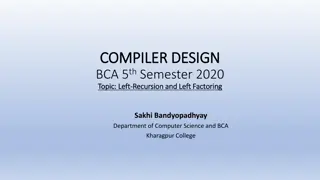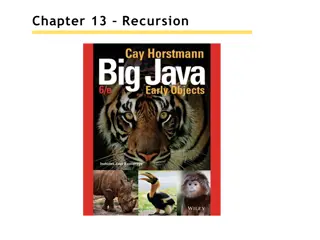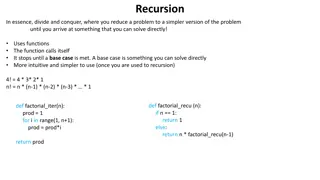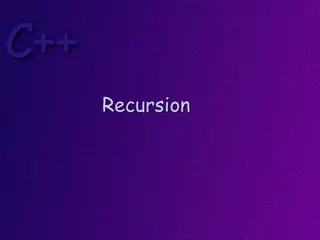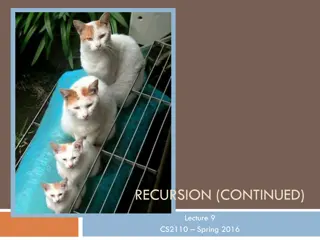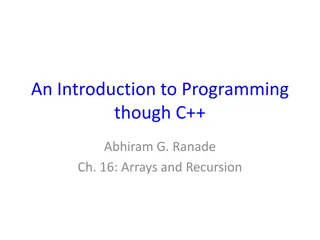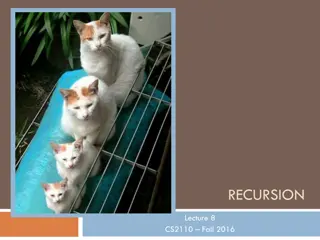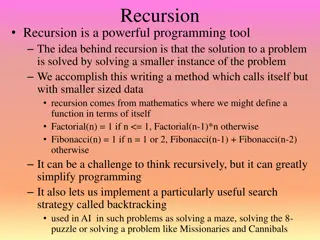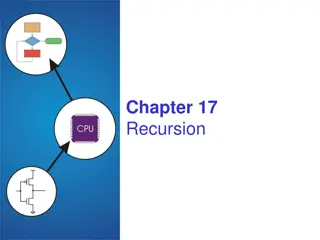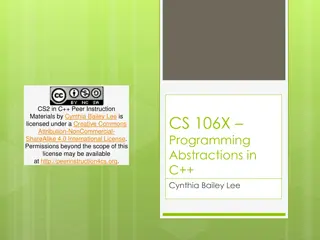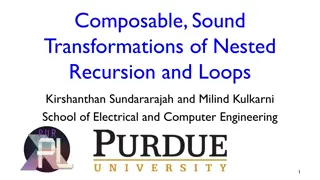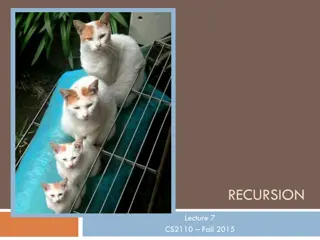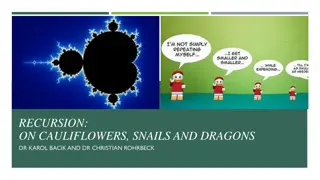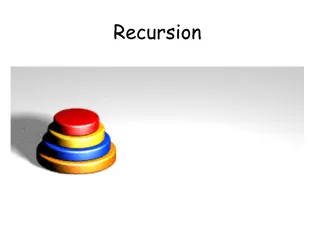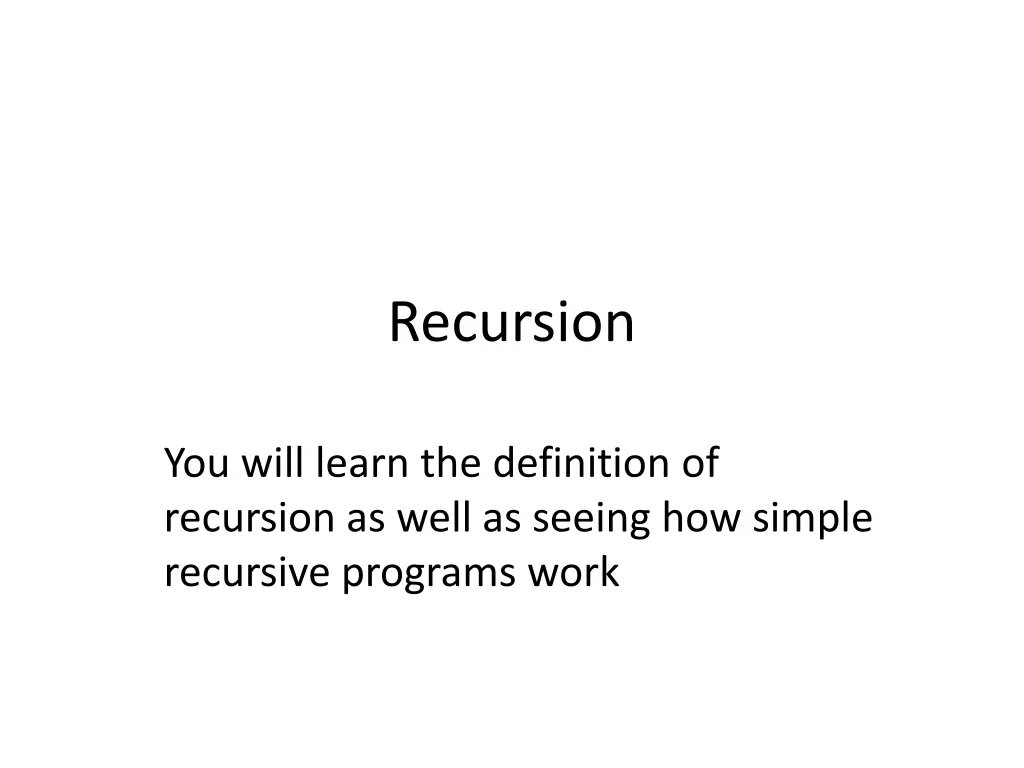
Understanding Recursion and Philosophy
Delve into the concepts of recursion and philosophy through simple explanations and images. Learn how recursion breaks down problems into steps and how philosophy explores the ultimate grounds of being. Discover the connections between metaphysics, ontology, and wisdom.
Download Presentation

Please find below an Image/Link to download the presentation.
The content on the website is provided AS IS for your information and personal use only. It may not be sold, licensed, or shared on other websites without obtaining consent from the author. If you encounter any issues during the download, it is possible that the publisher has removed the file from their server.
You are allowed to download the files provided on this website for personal or commercial use, subject to the condition that they are used lawfully. All files are the property of their respective owners.
The content on the website is provided AS IS for your information and personal use only. It may not be sold, licensed, or shared on other websites without obtaining consent from the author.
E N D
Presentation Transcript
Recursion You will learn the definition of recursion as well as seeing how simple recursive programs work
What Is Recursion? the determination of a succession of elements by operation on one or more preceding elements according to a rule or formula involving a finite number of steps (Merriam-Webster online)
What This Really Means Breaking a problem down into a series of steps. The final step is reached when some basic condition is satisfied. The solution for each step is used to solve the previous step. The solution for all the steps together form the solution to the whole problem. (The Tam translation)
Definition Of Philosophy state of mind of the wise man; practical wisdom 1 See Metaphysics 1 The New Webster Encyclopedic Dictionary of the English Language
Metaphysics know the ultimate grounds of being or what it is that really exists, embracing both psychology and ontology. 2 2 The New Webster Encyclopedic Dictionary of the English Language
Result Of Lookup , Possibility One: Success I know what Ontology means!
Result Of Lookup, Possibility One Philosophy? Metaphysics? Success! I ll take a Philosophy option. Ontology!
Result Of Lookup, Possibility Two: Failure Lookup loops back.
Result Of Lookup, Possibility Two Philosophy? Metaphysics? Rats!!! See previous Ontology?
Ontology equivalent to metaphysics. 3 3 The New Webster Encyclopedic Dictionary of the English Language Audio curtesy of James Tam
Result Of Lookup, Possibility Three: Failure You ve looked up everything and still don t know the definition!
Looking Up A Word if (you completely understand a definition) then return to previous definition (using the definition that s understood) else lookup (unknown word(s))
Related Material: Recursion A programming technique whereby a function or method calls itself either directly or indirectly. James Tam Tardis images: colourbox.com
Direct Call void fun() ... fun(); function James Tam
Indirect Call f1 f2 James Tam
Indirect Call f1 f2 f3 fn James Tam
Requirements For Sensible Recursion 1) Base case 2) Progress is made (towards the base case)
Example Program: SumSeries.java static int sum(int no) { if (no == 1) return(1); else return(no + sum(no-1)); } sumSeries 6 total = sum(3) sum (3) if (3 == 1) return(1); else return(3 + sum (3 1)); F main(String args []) { ... System.out.print("Enter the last number: "); last = in.nextInt(); total = sum(last); System.out.println("The sum of the series from " + "1 to " + last + " is " + total); } 3 sum (2) if (2 == 1) return(1); else return(2 +sum (2 1)); F 1 sum (1) if (1 == 1) return 1 T
When To Use Recursion When a problem can be divided into steps. The result of one step can be used in a previous step. There is a scenario when you can stop sub-dividing the problem into steps (step = recursive call) and return to a previous step. Algorithm goes back to previous step with a partial solution to the problem (back tracking) All of the results together solve the problem.
When To Consider Alternatives To Recursion When a loop will solve the problem just as well
Types Of Recursion: Tail recursion: Aside from a return statement, the last instruction in the recursive function or method is another recursive call. tail(int x) { System.out.println(x); if (x < 10) tail(++x); // Last real instruction (implicit return) } This form of recursion can easily be replaced with a loop. Non-tail recursion: The last instruction in the recursive function or method is NOT another recursive call e.g., an output message nonTail(int x) { if (x < 10) nonTail(++x); System.out.println(x); // Last instruction } This form of recursion is difficult to replace with a loop (stopping condition occurs BEFORE the real work begins). James Tam
Simple Counting Example Name of the example program: TailDriver.java First example: can be directly implemented as a loop public class TailDriver { public static void tail (int no) { if (no <= 3) { System.out.println(no); tail(no+1); } return; } public static void main (String [] args) { tail(1); } } James Tam
Reversed Counting Example Name of the example program: NonTailDriver.java public class NonTailDriver { public static void nonTail(int no) { if (no < 3) nonTail(no+1); System.out.println(no); return; } public static void main (String [] args) { nonTail(1); } } James Tam
Error Handling Example Using Recursion (2) Name of the example: ErrorCheckingDriver.java Iterative/looping solution (day must be between 1 31) public static int promptDay() { int day = -1; Scanner in = new Scanner(System.in); System.out.print("Enter day of birth (1-31): "); day = in.nextInt(); if ((day < 1) || (day > 31)) { day = promptDay(); } return(day); ... birthDay = promptDay() James Tam
Drawbacks Of Recursion Function calls can be costly Uses up memory Uses up time
Benefits Of Using Recursion Simpler solution that s more elegant (for some problems) Easier to visualize solutions (for some people and certain classes of problems typically require either: non-tail recursion to be implemented or some form of backtracking )
Common Pitfalls When Using Recursion These three pitfalls can result in a runtime error No base case No progress towards the base case Using up too many resources (e.g., variable declarations) for each function call
No Base Case int sum(int no) { return(no + sum (no - 1)); }
No Base Case int sum(int no) { return(no + sum (no - 1)); } When does it stop???
No Progress Towards The Base Case int sum (int no) { if (no == 1) return(1); else return(no + sum (no)); }
No Progress Towards The Base Case int sum (int no) { if (no == 1) return(1); else return(no + sum (no)); } The recursive case doesn t make any progress towards the base (stopping) case
Using Up Too Many Resources Name of the example program: RecursiveBloat.java public static void fun(int no) { char [] array = new char [500000000]; // 1000 MB System.out.println(no); no = no + 1; if (no <= 888) fun(no); }
Undergraduate Student Definition Of Recursion Word: re cur sion Pronunciation: ri-'k&r-zh&n Definition: See recursion Audio curtesy of James Tam
Recursion: Job Interview Question http://www.businessinsider.com/apple-interview-questions-2011-5#write-a-function-that-calculates-a-numbers-factorial- using-recursion-9
You Should Now Know What is a recursive computer program How to write and trace simple recursive programs What are the requirements for recursion/What are the common pitfalls of recursion

